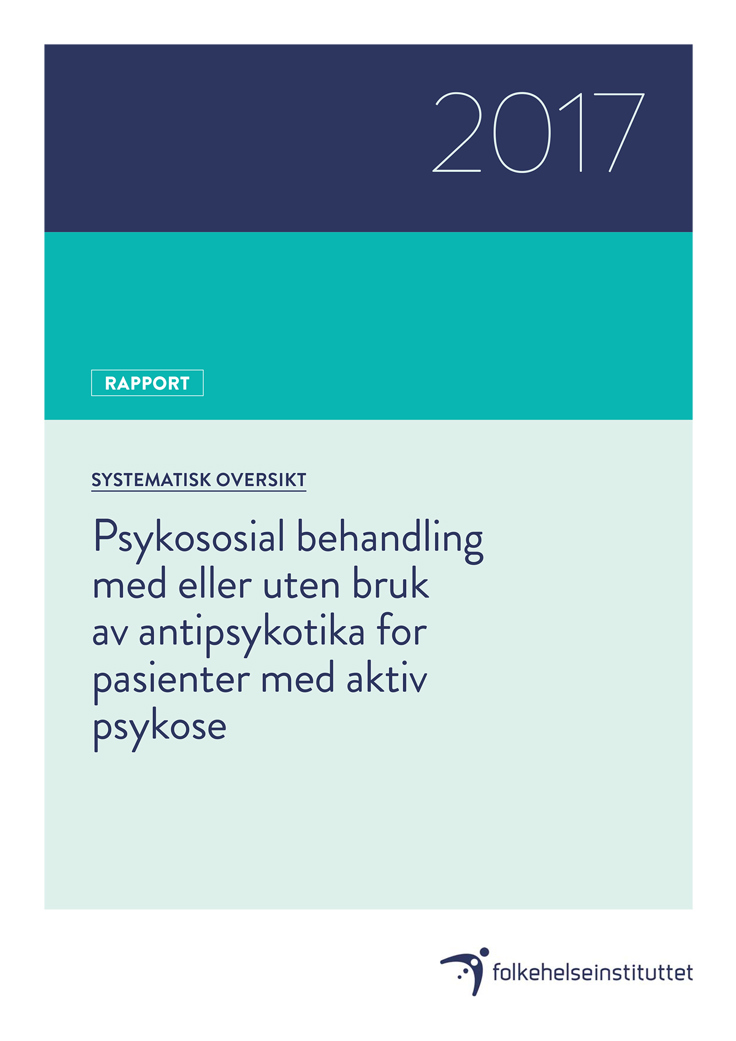Systematic review
Psychosocial treatment with or without antipsychotics for patients with active psychosis, a systematic review
Systematic review
|Published
Our objective was to identify and review studies on psychosocial treatment without use of antipsychotics compared to the same treatment with use of antipsychotics for patients with active psychosis.
Download
Key message
In a letter to the regional health authorities of November 26, 2015, the Ministry of Health and Care Services stated that all patients in psychiatric care should be able to choose treatments without medication, when appropriate. Offering treatment without antipsychotics has been an expressed wish by patients suffering from psychosis, but the benefits and harms of treatment without medication for patients in active psychosis is unknown.
The objective of the project was to identify and review studies on psychosocial treatment without use of antipsychotics compared to psychosocial treatment with use of antipsychotics for patient with active psychosis.
Two commissions were received at the same time, and as both comprised the effect of an intervention with and without antipsychotics for the same group of patients, the search was combined. We searched for references in five electronic databases and identified almost 20 000 reference for the effect of psychosocial treatment or physical activity for patients with active psychosis. After reviewing the references and possibly relevant articles, we found no studies that had evaluated the effect of psychosocial treatment without use of antipsychotics compared to psychosocial treatment where the patient with active psychosis with simultaneous use antipsychotics.
The effects of treatment of persons with active psychosis without antipsychotics is therefore uncertain.
Summary
Background
In a letter to the regional health authorities of November 26, 2015, the Ministry of Health and Care Services stated that all patients in psychiatry care should be able to choose treatment without medication, when it is appropriate. Offering treatment without antipsychotics have been an expressed wish by patients suffering from psychosis, but the benefits and disadvantages of treatment without medication for patients in active psychosis is unknown.
Objective
The objective of the project was to conduct a systematic review of the effect of various psychosocial therapies with simultaneous use of antipsychotics compared to the same psychosocial therapies without use of antipsychotics for persons with active psychosis. In a mapping review from 2016 we found many systematic reviews on non-medical interventions, however, the treatments were given in addition to, not instead of, medications.
Method
The commission from the Health directorate was delivered together with a project for reviewing the effect of physical activity with and without antipsychotics. We conducted both projects simultaneously and made the search for literature for both projects combined. We searched for references in five electronic databases and identified almost 20 000 references for the effect of psychosocial treatment or physical activity for patients with psychosis.
Population: Adults, 18 years or older, with active psychosis due to mental illnesses (ICD10 F20-29) that were not treated with antipsychotics at the start of the episode of psychosis. Active psychosis means presence of positive symptoms such as delusions (e.g. paranoid) and sight or hearing hallucinations etc.
Intervention: Psychosocial intervention without simultaneous use of antipsychotics
Comparison: The same psychosocial intervention with simultaneous use of antipsychotics
Outcome: Ease of symptoms, change of functional level, mortality, adverse reactions, life quality, brain changes, rehospitalisation, participation in work or education as described in the actual study
Study design: Randomised controlled trials, quasi-randomised studies, controlled before and after studies, prospective controlled cohort studies.
Two authors have independently reviewed the references identified. One author read all references, while the co-authors divided the references between them. Selected references were ordered in full text and evaluated of the same two persons that evaluated titles and abstract.
Results
After reviewing references and possibly relevant articles, we found no studies that had evaluated the effect of psychosocial treatment without simultaneous use of antipsychotics compared to psychosocial treatment where the patient with active psychosis with simultaneous use of antipsychotics for patients with active psychosis.
The effect of treatment without simultaneous use of antipsychotics is therefore uncertain.
Discussion
There is always a possibility that we may have missed relevant studies, but we consider the risk to be very small. We have conducted a very thorough search for literature and read a large number of references. The questions posed in the identified references cover psychosis, psychosocial treatment and use of antipsychotics, but not in the same study. We have read the references of some relevant systematic reviews, but not identified studies we could include.
The large number of identified references, and the large number of editorials and comments among them, indicate that research questions about use of antipsychotics are very important and relevant, and has the attention of many.
The Ministry of Health and Care Services has expressed that all patients should have offers of treatment without medication, when appropriate. When starting such interventions robust evaluations should be used with a controlled study design. It is important to get knowledge about pros and cons with such treatments. The evaluations should be published, so they can be available to clinicians and other persons with interest in the topic.
Conclusion
We found no studies that evaluated the effect of psychosocial treatment without simultaneous use of antipsychotics compared to psychosocial treatment of patients with active psychosis with simultaneous use of antipsychotics. Therefore we cannot conclude about the effect of this intervention.


